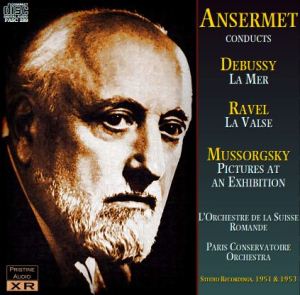 |
 |
|

availability
CD & download: Pristine
Classics
|
Claude DEBUSSY (1862-1918)
La mer (1905) [22:09]
Maurice RAVEL (1875-1937)
La valse (1920) [13:23]*
Modest MUSSORGSKY (1839-1881)
Pictures at an Exhibition (1874, orch. Ravel, 1922) [32:08]+
 L'Orchestre de la Suisse Romande, *Paris Conservatoire Orchestra/Ernest
Ansermet
L'Orchestre de la Suisse Romande, *Paris Conservatoire Orchestra/Ernest
Ansermet
rec. Victoria Hall, Geneva, March 1951, +December 1953; *La Maison
de la Mutualité, Paris, June 1953
 PRISTINE AUDIO PASC 289 [67:41]
PRISTINE AUDIO PASC 289 [67:41]
|
|
|
I was all set to dismiss this release as superfluous. After
all, Ansermet re-recorded all this material in excellent stereo
- La mer, in fact, twice. The rationale for resuscitating
these earlier versions seemed murky. However, the dazzling 1953
Pictures at an Exhibition testifies to what the Decca
engineers could do even working in monaural. That said, it has
taken Pristine Audio's digital processing to reveal the full
extent of their full accomplishment. The reproduction is truthful
in timbre, easily encompassing a full range of dynamics. Only
a touch of congestion on the full-throated brass chords of Catacombs
betrays any limitations.
Ansermet's performance gives the score's pictorial elements
full measure, while maintaining an unbroken musical line, both
within and between movements. The serious movements at the start
- Gnomus, Bydlo, and The Old Castle - are
evocative. The saxophone in the last-named is plangent yet contained.
By contrast, the scherzando movements - Tuileries,
Ballet of the Unhatched Chicks, and Limoges -
are perky and alert. Baba-Yaga is vigorous and mobile,
yet unpressured. The Great Gate of Kiev begins with dignified
restraint and opens out more grandly as it proceeds.
The Suisse Romande orchestra, as usual in its "core" repertoire,
plays with commitment - the more so, I suspect, for its not
being a sleek virtuoso ensemble. The clear, unified strings
muster some impressive dynamic surges and these are captured
well. The woodwind is expressive and piquant, with pointed articulation.
The principal horn's voicing of the second Promenade
is clunky and dispirited, but the solo trumpet is excellent
in Samuel Goldberg and Schmuyle. The brass choir, as
suggested, is firm and well-balanced.
The other items sound comparatively run-of-the-mill. La mer
is surprisingly clear for 1951 but the climaxes don't fill out
and expand as they would in stereo - or, for that matter, as
they do in the Pictures. The violins sound dry in exposed
moments.
Ansermet's lithe, even balletic interpretation sounds more spontaneous
than in his remakes. The conductor impulsively pushes the music
forward here and marks the rhythms more strongly there. The
calmer passages make a good contrast, though the recording militates
against "atmosphere". I'm pleased, however, to hear the composer's
added brass parts, which most conductors don't use, at 5:59
in the finale; without them, the passage is bare and aimless.
A change of venue doesn't benefit La valse. The Paris
Conservatoire Orchestra was officially the "Orchestra of the
Concert Society of the Paris Conservatory", a professional group,
not the school orchestra. It suffered, according to John Culshaw's
memoir Putting the Record Straight, a rampant deputy
system that worked against achieving any consistent level of
polish. Its recordings stand as testimony. Remarkably, and despite
the mushy "placement" of numerous after-beats, Ansermet still
projects the piece in a broad, coherent arc, though the introduction
and coda are noticeably deliberate.
Veteran discophiles will be curious about this Pictures.
For the general collector, however, Ansermet's shimmering, demonstration-quality
remake on Decca Eloquence will be the more logical choice; avoid
the toppy Weekend Classics issue. Also strong contenders are
the higher-octane accounts of Ormandy (RCA), Giulini (DG), or
Ozawa (RCA).
Stephen Francis Vasta
Stephen Francis Vasta is a New York-based conductor, coach
and journalist.
Masterwork Index: La
mer ~~ Pictures
at an exhibition
|
|












